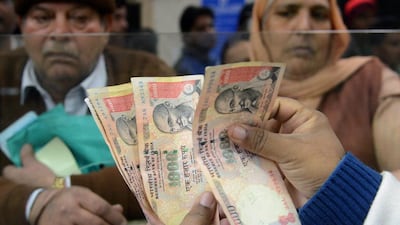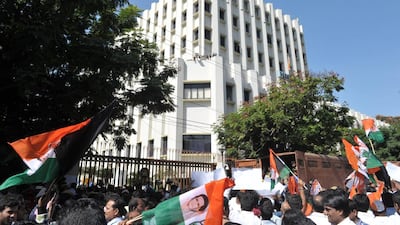MUMBAI // Yeshwant Sreenivasan laments that his restaurant, Laxmi – an inexpensive South Indian joint in Mumbai – is not full during a weekday lunchtime.
Business is not as bad as it was a few months ago in the immediate aftermath of a note ban on India’s highest two value notes when his trade more than halved. Now revenues are down by about 25 per cent. His restaurant only accepts cash.
“It will still take a bit of time,” he says. “They say it will come back but to be frank the economy is still down.”
There are indications that the cash crunch and subsequent negative impact on businesses that followed demonetisation has eased and that many sectors in India are starting to see a return to normalcy.
The local media this month reported that gold smuggling into India has surged in recent weeks, following a slump after the note ban because Indians were not buying gold, citing this as a sign that things are stabilising. Data released by the government surprised many by showing that GDP grew by 7 per cent during the quarter the notes were withdrawn. But for some industries, including real estate, the pick-up is expected to take much longer and the reality on the ground is that many businesses are still feeling the impact of demonetisation.
Narendra Modi, India’s prime minister, made the shock announcement on November 8 that the country’s 1,000 rupees (Dh56) and 500 rupees notes would be invalid from midnight that night, as he moved to clamp down on India’s widespread problem with black money.
The move caused chaos. ATMs were drained of cash and huge queues formed at banks across the country in the following weeks as Indians deposited their old notes.
This cash crunch led to concerns about the economic impact and many small businesses and consumer-related companies, including jewellers and the real estate sector, took a hit.
The Reserve Bank of India (RBI) in a paper released on March 10, said the impact of demonetisation on the real economy had been “transient”.
“The adverse impact, in general, was short-lived as it was felt mainly in November and December 2016,” according to the RBI. “The impact moderated significantly in January and dissipated by and large by mid-February 2017, reflecting an accelerated pace of remonetisation.”
On Monday, the RBI ended the last of the withdrawal limits that accompanied demonetisation.
“Given the size and complexity of the Indian economy, there isn’t a simple common account about demonetisation’s impact on Indian industries,” says Vidya Mahambare, the associate professor of economics and finance at Great Lakes Institute of Management in Chennai.
“The negative unanticipated shock to demand from a sudden move to the currency ban however, appears to be a much more transitory in nature than what was feared.”
She cites examples of sectors that are experiencing definite signs of improvement.
“Car sales are recovering, while the adverse impact on motorcycle demand from rural India where the purchases are made largely in cash is expected to wane away as cash in hand improves,” she says. “Discretionary consumption spending on consumer durables and non-durables in the non-organised traditional retail shops is coming back as well. Cement prices too are rising barring in South India, suggesting a potential recovery in construction and infrastructure. As demand in these industries, which all have linkages to other industries, improves we will see a return to normalcy elsewhere as well.”
Industries which are not largely cash- dependent are unsurprisingly proving the fastest to recover, with digital transactions increasing post-demonetisation.
“Initially our industry did face such obstacles, but now gradually the industry is close to complete recovery,” says Mazhar Nadiadwala, the managing director of Dome Entertainment, which stages sports and entertainment events in Mumbai. “Besides the other modes of revenue, the key source lies mainly in ticketing and sponsorship. With most of the city events listed with one or multiple ticketing platforms, most of the transactions take place via an electronic medium such as credit or debit card, pre-loaded electronic wallets, thus involving no cash. This has in a way eased out the process and the response of the audience is reaching its peak again. The sponsorships on the other hand are also coming back to normalcy as the rest of the industries are adapting to the trends of the new policies.”
But some sectors will take much longer to recover, experts say.
The property market, which has long been a major beneficiary of cash flows – both illegal and legal funds – has been particularly hard hit by demonetisation.
It resulted in sales and launches at the end of last year plunging to their worst level since the global financial crisis, causing a 226 billion rupees industry loss in the fourth quarter, according to Knight Frank.
“It’s still not very inspiring in terms of actual sales,” says Samantak Das, the chief economist and national director at Knight Frank. “Lots of traction has happened in terms of inquiries which were absolutely down during November and December. That’s a good trend.”
He adds that “demonetisation helped cleanse the system”.
K Shankar, the chief executive of Feedback Consulting, which helps firms to expand in or enter India, says that the real estate sector could take up to year to rebound from the impact of demonetisation because of its dependence on cash transactions.
He adds that demonetisation would ultimately benefit the economy “because a lot of cash is going to come back to the government through this route” and that the move had “set the cat among the pigeons” and that it had become unattractive to hold cash outside of the banks.
Kumar Jain, who runs a jewellery shop in Zaveri Bazaar, a gold market in Mumbai, says that his sales are still very weak because of the impact of demonetisation.
“It will take another six months to have a proper cycle of this industry,” he says.
The ruling Bharatiya Janata Party (BJP) this month won a landslide victory in Uttar Pradesh, India’s most populous state, which is seen as an indicator that the country’s poor backed Mr Modi’s demonetisation move, despite the disruption it caused to their lives, given that they are highly dependent on cash and many are without bank accounts.
“BJP’s thumping win in the elections though has sort of proven that the economically weak have backed him fully,” says Archit Gupta, the founder and chief executive of ClearTax.com, a popular tax preparation and e-filing platform. “Demonetisation most definitely came as an initial shock, but with the RBI fully remonetising, it should set things in order sooner or later.”
Swapnil Kamat, the founder and chief executive of Work Better Training & Development, a skill development company, says his industry has been hit hard by demonetisation.
“Commercial spending has been at an all-time low in the last four to five months,” he says. “As a training company that is part of the skills development industry in India, the last five months have been extremely challenging, with us and other companies in the sector losing out on a lot of business. With the number of people in the economy who lost jobs post demonetisation, especially from the unorganised sector, all the skilling projects undertaken by the government also took a huge hit.”
But the situation has reached a turning point, he believes.
“With the new financial year just around the corner and the government removing all limitations from withdrawals and spends, we see a brighter time for the industry in the coming months,” Mr Kamat says. “The next few months will see a steady increase in the commercial spending of organisations. While other industries are also on the path to recovery, we expect to see the rate of hiring increase in organisations.”
In the case of Mr Sreenivasan, he hopes that the name of his restaurant, Laxmi, which refers to the Hindu goddess of wealth, might bring him some good fortune.
“Hopefully things will return to normal.”
__________
Industry leaders share their views on the current impact of demonetisation:
■ Travel and tourism
“While demonetisation was a great step to curb the black money in the country, like any other industry the travel industry too took a hit initially when it was enforced. We saw a lot of travellers postponing their plans and some cancelling. However, the slowdown was for a while, and we have seen a sharp shoot up in online payment. Things have become pretty normal and the effect seems to be dwindling. With the summer season approaching, we expect business to shoot up tremendously.”
– Aurvind Lama, the co-founder and chief executive of Travelyaari
■ Jewellery
“Although the negative impact is coming to an end, it will take another quarter for the normalcy and positives to show effect.”
– Ishu Datwani, the founder of Anmol Jewellers
■ Solar energy
“The impact of demonetisation on our business was never very pronounced, although it did impact us indirectly via our customers and suppliers. Taking a broader view, the solar business in India is growing at more than two times every year because of strong economic fundamentals, and this overall growth trajectory was not significantly affected by demonetisation.”
– Andrew Hines, business development head, South India, CleanMax Solar
■ Corporate India
“The impact on the corporate sector after seeing the overall corporate financial results for the December quarter appears to be non-worrisome. Many sectors like metals, sales of machinery, mining have done well. The impact may continue for a quarter or two on a few sectors, especially where retail and private consumer spend is dependent.”
– Babu Sivaprakasam, a partner at Indian law firm ELP
business@thenational.ae
Follow The National's Business section on Twitter




